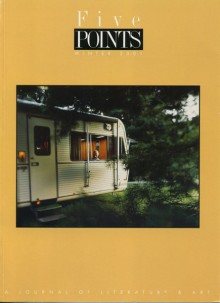Five Points, Vol. 5 No. 2
Winter 2001From Gail Godwin, “You have to be very honest with yourself, almost visceral.”
Sample Content
Ann Beattie
Melancholy and the Muse
I don’t know what it would be like not to be a writer. Part of the reason I became a writer was because in dealing with ordinary problems, my imagination is usually quite deficient. If the problem can best be solved in a way that doesn’t require imagination, I’m all for tackling it through logic. Since my coping skills are not that great, however, on a daily basis I tend to feel defeated. Even those times I have to deal with the mistakes made by others, coping tends to leave me feeling defeated, however successful the results. I’m not one of those crafty people who sees that the tip of a shoelace can be used as a flint. I don’t improvise well. I’m decisive, but alas: my temperament does me in time after time, because my decisiveness is tempered by caution. I am not an entirely different being when I write, but because writing removes me from the world, I can at least pretend that things might be as I want them to be, if only I—I alone—imagine correctly. In writing, I dismiss the idea of caution vs. risk, because the concept of caution doesn’t apply: caution is counter-indicated when dealing with a rough draft. When revising, I’m capable of replacing entire pages with an asterisk and moving emphatically through time. It comes with the territory—dispensing with what’s unnecessary, however much you like it. You have to trust your intuition about where you’re going, and go, however unfamiliar the territory. If this sounds like some artistic version of military training, it is. But, the thing is, as a writer you never get out of boot camp. All your practice, and all your resolve, to say nothing of your high standards, will not necessarily get you anywhere. In the military, you learn how to protect yourself, but being safe is the last thing that will serve you as a writer. As a writer you spend time forgetting the rule, forgetting what you know, so you can write, instead, those things your characters know. Quite often, characters serve the function of informing writers of things he or she does not know. Past writing performance—at least, in my experience—counts for little. Neither the routine, nor the triumphs that sometimes result from adhering to that routine, can be depended upon. I have sometimes taken down books I’ve published from the shelves and been amazed that there was a time when I apparently wrote once sentence after another followed by even more sentences, to form a paragraph. Such an odd activity: needing to simultaneously remember and to forget something in order to bring into focus what did not happen, but might have.

